None of the Chicago casino finalists rolled double sixes at community meetings staged by Mayor Lori Lightfoot, complicating the future of the gaming palace and entertainment district officials contend is key to the city’s financial future.
While city officials touted the meetings as a chance for Chicagoans to weigh in on the three finalists jockeying to build the long-awaited Chicago casino, the bulk of the sessions featured slick videos and speeches from the development teams touting the benefits of their proposals. Of the six hours scheduled for the meetings, less than a third of the time was reserved for Chicagoans to question the development teams directly.
When Chicago residents did get a chance to pepper the teams from Rush Street Gaming, Bally’s and Hard Rock with questions, many said they were deeply concerned the proposals would snarl traffic, reduce property values, fuel crime, diminish their quality of life and trigger a wave of problematic gambling in their neighborhoods. Many seemed unconvinced that a casino was a good idea anywhere in Chicago.
All three finalists must address those concerns — and prove their casino will boost businesses owned by Black and Latino Chicagoans, who have not benefitted from major developments in Chicago the way businesses owned by White Chicagoans have in the past.
After the sessions, it is not clear if any of the proposals have the inside track to win Lightfoot’s backing — or whether any of the plans could make it through a Chicago City Council that has proven it is willing to reject the mayor’s proposals and initiatives.
The looming legislative fight over the Chicago casino could also prove to be a major skirmish in the battle over aldermanic prerogative that has marked Lightfoot’s nearly three years in office.
None of the three alderpeople who represent the wards that would house the three finalists for the Chicago casino has endorsed the proposal. If that lack of support holds, Lightfoot could find herself hard pressed to find 26 votes for any of the proposals, just a few months before she faces voters in what is expected to be her bid to be the first woman to be re-elected as Chicago’s mayor.
It would be nearly unprecedented for the Chicago City Council to approve such a large and contentious development over the objections of the local alderperson. While Lightfoot has repeatedly vowed to uproot the largely unwritten, decades-old practice of aldermanic prerogative, she has not come close to achieving that goal amid consistent — and implacable — opposition among even her allies on the City Council.
While Ald. Walter Burnett told reporters he is open to Bally’s proposal in the River West neighborhood of his 27th Ward, Ald. Sophia King (4th Ward) has taken no position on Hard Rock’s proposal to build the casino over train tracks west of Soldier Field.
However, Ald. Byron Sigcho Lopez (25th Ward) has emerged as a full-throated critic of the proposal from Neil Bluhm’s Rush Street Gaming to build the Rivers 78 Casino on vacant land between the South Loop and Chinatown along the Chicago River set to be redeveloped by Related Midwest into a new development known as The 78.
With his close ties to Chicago’s political and economic leaders, Bluhm has long been perceived as the front-runner in the high-stakes craps game that will determine the future of Chicago’s casino.
“I’m concerned the writing is already on the wall,” Sigcho Lopez told WTTW News, adding that he heard nothing during Thursday’s community meeting to change his mind.
All three proposals to build a casino and resort in Chicago promise they would boost the city’s economy and funnel approximately $200 million into the city’s police and fire pension funds, significantly easing the pressure on the city’s finances, while creating “thousands” of jobs.
Sigcho Lopez said that the pressure on his City Council colleagues to approve a casino regardless of what the local alderperson or community wants will be intense because of the impact a casino could have on the city’s finances, which were precarious before the COVID-19 pandemic and have only worsened.
“I have serious, legitimate concerns,” said Sigcho Lopez, who is the only member of the City Council whose ward includes a potential casino location to not be included on the so-called “super committee” that will consider Lightfoot’s pick for where a Chicago casino should be located, and who should run the gambling and entertainment palace.
Sigcho Lopez said his exclusion from that committee proves the casino selection process is “rigged.”
Remap Fight Becomes Casino Proxy Battle
However, it is not clear that The 78 — and its potential casino — will stay in Sigcho Lopez’s 25th Ward.
The map supported by the Chicago City Council’s Black Caucus moves the 62-acre development to Ald. Pat Dowell’s 3rd Ward. Sigcho Lopez opposes that shift, and has endorsed the map backed by the Latino Caucus. The 78 would stay in the 25th Ward under that plan.
Dowell, a member of the Black Caucus, is running to replace retiring U.S. Rep. Bobby Rush.
The map supported by the Latino Caucus would also shift the location of the proposed Bally’s casino from Burnett’s 27th Ward to a redrawn 34th Ward. Indicted Ald. Carrie Austin (34th Ward) has said she plans to retire in 2023, and her Far South Side ward would essentially be absorbed into the 21st Ward.
While both maps would create a new ward to represent the booming population near downtown, the map backed by the Latino Caucus would center it west of the Loop, and include River West.
Lightfoot, whose floor leader Ald. Michelle Harris (8th Ward) led the effort to create the map backed by the Black Caucus, has said she will not endorse either map, and urged both groups to compromise and avert a referendum on the ward boundaries now set for June 28.
What Are The Odds?
The team behind each casino finalist had its turn in the hot seat last week, presenting its case to Chicagoans at a series of community forums, like suitors come a’courting. With those meetings complete, the roulette ball bounces back to Lightfoot, who is expected to make her decision within the next two months.
Here’s what you need to know about the players, their proposals and the odds stacked for — and against — each proposal.
Hard Rock Casino
 Hard Rock wants to build the casino and resort as part of the proposed One Central development, across DuSable Lake Shore Drive from Soldier Field. (Provided)
Hard Rock wants to build the casino and resort as part of the proposed One Central development, across DuSable Lake Shore Drive from Soldier Field. (Provided)
The Basics
The $1.74 billion Hard Rock Chicago casino would include a 3,500-seat music venue, a 500-room hotel and a food hall in addition to a casino with 3,000 slot machines and 166 table games.
A Hard Rock Chicago casino could also compete with the Hard Rock casino 29 miles away in Gary, Indiana, according to a study prepared by the city’s casino consultant.
“The city will want to be comfortable that the operator will work to maximize revenues in the Chicago casino,” according to the study. “This dynamic is especially important for the Chicago casino since approximately 75% of gaming revenues are projected to come from local activity.”
Because taxes on slot machine wagers are lower in Indiana, Hard Rock officials may have an “incentive” to send slot aficionados to Gary, according to the study. Taxes on wagers placed in table games would be lower in a Chicago casino than in Gary, officials said.
Key Players
The money guy: Jim Reynolds, founder, chairman and CEO of Loop Capital. Reynolds grew up in Englewood and graduated from Chicago Vocational High School.
The casino guy: Jim Allen, chairman of Hard Rock International and CEO of Seminole Gaming
The real estate guy: Bob Dunn, head of Landmark Development, which is developing the One Central site.
The Pitch
Location, location, location. A casino needs a “tourist-centric” location, Dunn said, and Hard Rock has it, situated at the crossroads of civic and cultural assets. There’s already plenty of parking, transit and existing utilities. Unlike the other two finalists, Hard Rock’s traffic would largely enter from highways, not city side streets, he said.
Allen touted Hard Rock’s experience in running casinos and the connections it already has in the business. The company operates in 70 countries around the world and its partners include Jay-Z's Roc Nation.
All three proposals require that 25% of the facility be owned by Black, Latino or Asian shareholders, 50% of its employees be from Chicago and at least 26% of the construction contracts go to firms owned by women or Black, Latino or Asian Chicagoans.
Hard Rock’s proposal exceeds the minimum requirements with Loop Capital holding a 50% stake in the project. The Black-owned firm has also partnered with the Chicago Urban League to set up a vocational training center at Chicago Vocational High school to train employees for the casino and resort.
Community Reaction
Many of the questions facing Hard Rock involve its location in the proposed — but not yet approved — One Central development.
A $20 billion mixed-use development that would be built over the train tracks west of Soldier Field, One Central relies on $3.8 billion in state subsidies to create the transportation center that would funnel residents, shoppers and workers into the development. The City Council would also have to approve a zoning change for the area, which is mostly in Dowell’s 3rd Ward.
South Loop resident Marj Halperin told Dunn the uncertainty over the One Central development and its unpopularity with nearby residents was a “millstone around your neck” during the community meeting that took place Tuesday.
Dunn and Allen repeatedly said the casino has been “uncoupled” from the broader One Central plan and could move forward even if the rest of One Central remains stalled.
Temporary Casino
Hard Rock had proposed using McCormick Place Lakeside Central but that’s been taken off the table. The team is considering setting up the temporary casino at a downtown hotel, officials said.
Bally’s Casino
 Bally’s is proposing to build a casino and resort on what is now the Chicago Tribune printing plant and newsroom near Chicago Avenue and Halsted Street. (Provided)
Bally’s is proposing to build a casino and resort on what is now the Chicago Tribune printing plant and newsroom near Chicago Avenue and Halsted Street. (Provided)
The Basics
The $1.74 billion proposal from Bally’s to build the casino and resort with 3,400 slots and 173 table games as well as a 500-room hotel on what is now the Chicago Tribune printing plant and newsroom near Chicago Avenue and Halsted Street.
The Bally’s casino would be the most lucrative for the city and its sister agencies, ringing up $191.7 million in its sixth year of operations, according to the study from the city’s gaming consultant. Bally’s is the only finalist that does not operate another nearby casino. Rush Street Gaming operates a casino in Des Plaines and Hard Rock operates a casino in Gary.
Key Player
The casino guy: Soo Kim, chairman of Rhode Island-based Bally’s.
The Pitch
Bally’s casino would be close to the city’s “urban core,” Kim said, and would draw people into the city rather than pushing them toward the edges, accelerating the benefits of the casino for other businesses and attractions while creating stable jobs that will lift families into the middle class.
Confronted by residents concerned about the traffic the casino would generate, Kim told them a casino would mean less gridlock than the 6,000 apartments and condominiums and 4.7 million square feet of office space already approved for the site by city officials.
“This (site) will get built, so that traffic is coming,” Kim. “Our site gives the most flexibility.”
Bally’s has put together a consortium — the Chicago Community Builder’s Collective — of design and construction firms owned by Black, Latino and female Chicagoans to work on the project.
Community Reaction
Though Bally’s vowed that the casino wouldn’t have “flashing neon lights” or turn the area into the Vegas Strip, residents were unmoved, with many saying a casino did not belong in the middle of their neighborhood.
Temporary Location
It would take approximately a year to convert a warehouse on the Tribune site into a temporary casino, while the permanent complex is under construction, officials said.
Rivers 78
 Rush Street has proposed a Rivers Casino as part of the under-construction 78 development on vacant land between the South Loop and Chinatown along the Chicago River. (Provided)
Rush Street has proposed a Rivers Casino as part of the under-construction 78 development on vacant land between the South Loop and Chinatown along the Chicago River. (Provided)
The Details
The $1.62 billion proposal from Rush Street Gaming, including 2,600 slots and 190 table games, would generate $174 million for the city and its sister agencies, the least amount of the three casino proposals still under consideration.
However, that estimate relies on the construction of a planned observation tower and hotel as part of the resort, and Rush Street officials have not yet provided city officials with evidence they will be able to obtain financing for that part of their proposal. Rush Street officials said they planned to provide those assurances to city officials. Without the tower, the casino would earn far less, according to the study.
Like the proposal from Hard Rock, city officials sounded a warning bell about the proximity of the firm’s other casino. The Rivers Des Plaines casino is 17 miles from the proposed Chicago casino, which would include a riverfront plaza; an observation tower with indoor and outdoor space; a riverfront venue for live entertainment as well as a 300-room hotel tower as well as a food hall.
Key Players
The casino guy: Bluhm, whose close ties to Chicago’s political and economic leaders has made him appear to be the front-runner in the high-stakes craps game that will determine the future of Chicago’s casino.
Lightfoot attended law school at the University of Chicago with Bluhm’s daughter Leslie Bluhm, and they remain close friends.
Despite Bluhm’s high profile, he did not appear at Thursday’s meeting, tapping new Rush Street Gaming CEO Tim Drehkoff to put the firm’s cards on the table.
The real estate guy: Curt Bailey, president of Related Midwest.
The construction guy: Nosa Ehimwenman, CEO of Bowa Construction.
The Pitch
The 78 — named to represent Related Midwest’s hope that the now-vacant 62 acres will join Chicago’s 77 community areas as a distinctive neighborhood — is a blank slate, allowing the casino to be built without changing the face of an existing neighborhood, Bailey said.
The development team — casting itself as Chicago’s “hometown team” — assured residents that the casino could coexist at The 78 with the Discovery Partners Institute, which would be part of the University of Illinois system as part of an effort to boost tech innovation and company growth.
The centerpiece of the entertainment district would be the 1,000-foot tall observation tower that would make the casino a destination for all tourists, regardless of whether they wanted to try their luck by betting on red or black.
“It will become instantly recognizable,” said Ann Thomson, executive vice president of architecture and design for Related Midwest. “This is aspirational. This is like the World’s Fair, this is Millennium Park.”
Community Reaction
Grace Chan McKibben, executive director of the Coalition for a Better Chinese American Community, joined a protest outside the community meeting on the Rivers 78 proposal, telling reporters that a casino just southwest of Chinatown was a bad idea.
Residents of Chinatown have been “preyed upon” by gaming companies and are uniquely vulnerable to casino advertising, Chan McKibben said.
Like the two other casino finalists, the development team also heard concerns about noise, traffic and reduction in the value of nearby property.
Temporary Location
Rush Street Gaming plans to set up a temporary casino with 1,000 slots and table games on the Chicago River, overlooking the under-construction permanent casino, within 12-18 months of the Chicago City Council’s approval — and the blessing of the Illinois Gaming Board.
Contact Heather Cherone: @HeatherCherone | (773) 569-1863 | [email protected]
Contact Patty Wetli: @pattywetli | (773) 509-5623 | [email protected]








